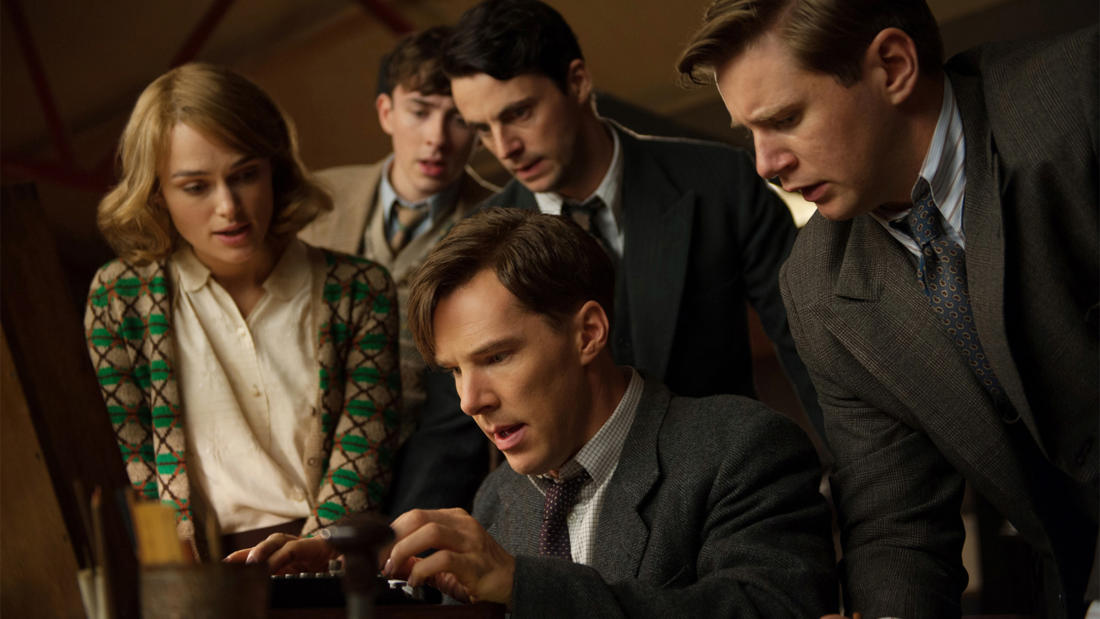
Jacob Burns Film Center Pleasantville, NY
Dr. Leslie Valiant
T. Jefferson Coolidge Professor of Computer Science and Applied Mathematics, Harvard University.; Recipient of the Turing Award and the Nevanlinna Prize
andDr. Craig Gentry
Research Scientist, Cryptography Research Group
moderated byDr. Glen Whitney
National Museum of Mathematics
The Imitation Game— The Lasting Impact of Turing's Work
Program Description
A panel discussion of the lasting impact of Turing's work and the intersection of math and culture.
Presented At
Jacob Burns Film Center Pleasantville, NY
Film Synopsis
During World War II, mathematician Alan Turing tries to crack the enigma code with help from fellow mathematicians.
Told via flashback, The Imitation Game tracks the young, brilliant, and socially awkward mathematician Alan Turing (Benedict Cumberbatch) in the early days of World War II as he applies for a top-secret position tasked with decoding the “unbreakable” Nazi cipher machine called Enigma, used to encrypt all military radio transmissions. Turing's team, including Joan Clarke (Keira Knightley), analyzes Enigma messages while he builds a machine to decipher them. His work was famously labeled by Winston Churchill as “the greatest single contribution to victory.” But after the war he suffered great personal and professional turmoil, as he dealt with his homosexuality in a time when it was illegal. The film was nominated in eight Academy Awards, including Best Picture, Best Director, Best Actor, and Best Supporting Actress. It won for Best Adapted Screenplay.
About the Speaker
Dr. Leslie Valiant is a computer scientist and computational theorist. He is currently the T. Jefferson Coolidge Professor of Computer Science and Applied Mathematics at Harvard University. Dr. Valiant was educated at King's College, Cambridge, Imperial College London, and University of Warwick where he received a PhD in computer science in 1974. Dr. Valiant is world-renowned for his work in theoretical computer science. Among his many contributions to complexity theory, he introduced the notion of #P-completeness to explain why enumeration and reliability problems are intractable. He also introduced the "probably approximately correct" (PAC) model of machine learning that has helped the field of computational learning theory grow, and the concept of holographic algorithms. His earlier work in automata theory includes an algorithm for context-free parsing, which is (as of 2010) still the asymptotically fastest known. He also works in computational neuroscience focusing on understanding memory and learning.
Dr. Craig Gentry is a computer scientist fueling a revolution in cryptography and theoretical computer science through his elegant solutions to some of the discipline’s most challenging open problems. He received a BS (1995) from Duke University, a JD (1998) from Harvard Law School, and a PhD (2009) from Stanford University. Prior to his PhD, he worked as an intellectual property lawyer (1998–2000) and as a senior research engineer for DoCoMo USA Labs (2000–2005). He is currently a research scientist in the Cryptography Research Group at the IBM Thomas J. Watson Research Center. His scientific research has appeared in proceedings such as STOC (Proceedings of the Annual ACM Symposium on Theory of Computing), FOCS (Proceedings of the Annual IEEE Symposium on Foundations of Computer Science), Crypto, and Eurocrypt, among others.
Dr. Glen Whitney is the president and founder of MoMath in New York City, North America's only math museum. He studied mathematics as an undergraduate at Harvard University, and earned a PhD in mathematical logic from the University of California at Los Angeles. He taught at the University of Michigan and worked at a hedge fund, Renaissance Technologies, before devoting his time to building the National Museum of Mathematics.